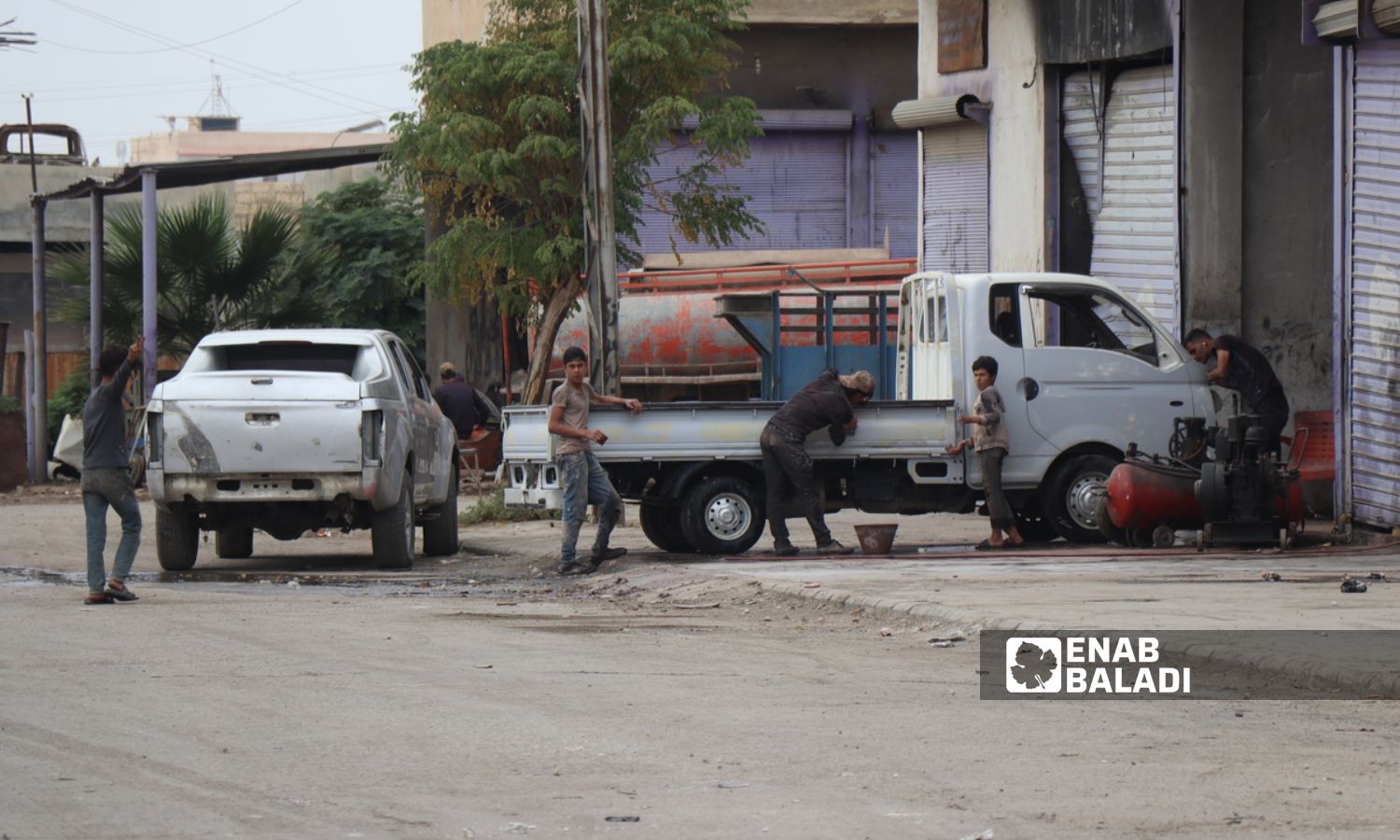



Enab Baladi – Ras al-Ain
A significant section of the shops in the industrial city of Ras al-Ain, northwest of al-Hasakah governorate, remains out of service four years after the battles that took place in the area between the Turkey-backed Syrian National Army (SNA) factions and the Syrian Democratic Forces (SDF).
Since 2019, the effects of destruction, devastation, and even looting are still present in the industrial city, with dozens of facilities ceasing production and their owners suffering significant losses.
The industrial city is considered a vital location in Ras al-Ain and an effective economic engine that complements the agricultural sector (the region’s main revenue supplier). It was initiated in 1994 and officially launched in 2007.
Shop owners who were forced to leave their establishments and sources of income are demanding support, renewing previous accusations against elements of the SDF and the SNA factions for the looting operations that targeted their shops during the “Operation Peace Spring” conducted by the National Army with Turkish support.
Mu’tasim al-Rahab, the owner of a shop that sells agricultural equipment in the Ras al-Ain industrial city, told Enab Baladi that his shop was completely destroyed as a result of the clashes, with losses exceeding $50,000. This forced him to switch from being a shop owner in the industrial city to a farmer in his father’s land.
Malik Abdul Aziz, owner of an auto repair shop in the industrial city, stated that his shop suffered 80% damage, and all the equipment he used for repairs was damaged.
He added that he cannot afford to rehabilitate and repair his shop, nor has he received any support from organizations or the Syrian Interim Government (SIG), the de facto authority running the region.
Samaan al-Jarad, the owner of a lathe workshop in the industrial city, complained about the poor infrastructure and destruction. He was also forced to borrow money to repair his lathe machine, with costs exceeding 15,000 US dollars.
He mentioned that his shop was burned and looted by the SDF before they left the area. He called on the Interim Government to provide support to the industrial city and rehabilitate it.
President of the Chamber of Commerce and Industry in the Local Council of Ras al-Ain, Hussain al-Raad, informed Enab Baladi that the total number of industrial shops is 350, with only 48 currently operating. This means that 85% of these shops are out of service.
Al-Raad stated that this is due to the destruction resulting from the SDF’s presence in the industrial city during the “Operation Peace Spring.”
He added that the rehabilitation of the industrial city requires a significant budget, and the capabilities of the local council are very limited. Nevertheless, he appealed to the Interim Government to provide support to the affected individuals and attract international organizations to this area to end the economic recession in Ras al-Ain.
Turkey manages the cities of Ras al-Ain and Tal Abyad in northern Syria, and the service institutions in these cities are operated through the governorate of Şanlıurfa in Turkey. The local council in the city oversees the implementation of service projects, which are considered modest compared to those implemented in northern Aleppo province.
Ras al-Ain and Tal Abyad are adjacent to the Turkish border and controlled by the National Army. They are surrounded by frontlines with the SDF, and the Turkish border is their only outlet to the outside world.
Human rights organizations documented widespread cases of “looting and robbery” that targeted public and private properties, including the contents of shops, workshops, and warehouses in the industrial city of Ras al-Ain, by the National Army factions after they gained control of the area.
The Syrians for Truth and Justice (STJ) organization reported that only a very small portion of the “stolen and looted” materials were returned by the National Army factions to their original owners. Another portion was sold and melted down, and it was traded for the benefit of local Syrian and Turkish merchants (who came from Turkey).
The organization, in its 2021 report, quoted a “reliable local source on the iron sales operations” as saying that the sales took place with the knowledge and coordination of the governor of Şanlıurfa, in collaboration between Turkish traders and the “Sultan Murad” and “Hamza” divisions. These import operations are usually prevented by the Turkish authorities to avoid competition with local Turkish products since the stolen raw materials from Syria are sold at a lower price than the prevailing price in the Turkish market.
Another part of the “looted” materials was also sold through the Fourth Division in the Syrian regime forces and by other merchants from Damascus in coordination with Ahrar al-Sharqiya and Jaish al-Sharqiya factions. The stolen materials exited the Tuffaha crossing about three months after “Operation Peace Spring” toward the “Hamsho” factories, according to the organization.
if you think the article contain wrong information or you have additional details Send Correction